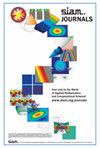将准共形几何应用于成像的深度学习框架,用于解决衍射映射问题
IF 2.3
3区 数学
Q3 COMPUTER SCIENCE, ARTIFICIAL INTELLIGENCE
引用次数: 0
摘要
SIAM 影像科学杂志》第 17 卷第 1 期第 501-539 页,2024 年 3 月。 摘要许多成像问题都可以表述为映射问题。一般的映射问题旨在获得最优映射,在给定约束条件下使能量函数最小化。解决映射问题的现有方法通常效率不高,有时还会陷入局部极小值。如果要求最优映射具有差分同构性,则会面临额外的挑战。在这项工作中,我们提出了一个基于准共形(QC)Teichmüller 理论的深度学习框架来解决这个问题。主要策略是学习代表映射的贝尔特拉米系数(BC),将其作为深度神经网络中的潜在特征向量。贝特拉米系数测量映射下的局部几何失真,从而提高深度神经网络的可解释性。在此框架下,映射的差异形态属性可通过网络内的简单激活函数进行控制。通过将 BC 整合到损失函数中,还可以轻松地对最优映射进行正则化。拟议框架的一个重要优势是,一旦网络训练成功,就能实时获得与每个输入数据信息相对应的优化映射。为了检验拟议框架的有效性,我们将该方法应用于差分图像配准问题。实验结果在效率和准确性上都优于其他最先进的配准算法,这证明了我们提出的框架在解决映射问题上的有效性。本文章由计算机程序翻译,如有差异,请以英文原文为准。
A Deep Learning Framework for Diffeomorphic Mapping Problems via Quasi-conformal Geometry Applied to Imaging
SIAM Journal on Imaging Sciences, Volume 17, Issue 1, Page 501-539, March 2024.
Abstract. Many imaging problems can be formulated as mapping problems. A general mapping problem aims to obtain an optimal mapping that minimizes an energy functional subject to the given constraints. Existing methods to solve the mapping problems are often inefficient and can sometimes get trapped in local minima. An extra challenge arises when the optimal mapping is required to be diffeomorphic. In this work, we address the problem by proposing a deep-learning framework based on the Quasiconformal (QC) Teichmüller theories. The main strategy is to learn the Beltrami coefficient (BC) that represents a mapping as the latent feature vector in the deep neural network. The BC measures the local geometric distortion under the mapping, with which the interpretability of the deep neural network can be enhanced. Under this framework, the diffeomorphic property of the mapping can be controlled via a simple activation function within the network. The optimal mapping can also be easily regularized by integrating the BC into the loss function. A crucial advantage of the proposed framework is that once the network is successfully trained, the optimized mapping corresponding to each input data information can be obtained in real time. To examine the efficacy of the proposed framework, we apply the method to the diffeomorphic image registration problem. Experimental results outperform other state-of-the-art registration algorithms in both efficiency and accuracy, which demonstrate the effectiveness of our proposed framework to solve the mapping problem.
Abstract. Many imaging problems can be formulated as mapping problems. A general mapping problem aims to obtain an optimal mapping that minimizes an energy functional subject to the given constraints. Existing methods to solve the mapping problems are often inefficient and can sometimes get trapped in local minima. An extra challenge arises when the optimal mapping is required to be diffeomorphic. In this work, we address the problem by proposing a deep-learning framework based on the Quasiconformal (QC) Teichmüller theories. The main strategy is to learn the Beltrami coefficient (BC) that represents a mapping as the latent feature vector in the deep neural network. The BC measures the local geometric distortion under the mapping, with which the interpretability of the deep neural network can be enhanced. Under this framework, the diffeomorphic property of the mapping can be controlled via a simple activation function within the network. The optimal mapping can also be easily regularized by integrating the BC into the loss function. A crucial advantage of the proposed framework is that once the network is successfully trained, the optimized mapping corresponding to each input data information can be obtained in real time. To examine the efficacy of the proposed framework, we apply the method to the diffeomorphic image registration problem. Experimental results outperform other state-of-the-art registration algorithms in both efficiency and accuracy, which demonstrate the effectiveness of our proposed framework to solve the mapping problem.
求助全文
通过发布文献求助,成功后即可免费获取论文全文。
去求助
来源期刊

SIAM Journal on Imaging Sciences
COMPUTER SCIENCE, ARTIFICIAL INTELLIGENCE-COMPUTER SCIENCE, SOFTWARE ENGINEERING
CiteScore
3.80
自引率
4.80%
发文量
58
审稿时长
>12 weeks
期刊介绍:
SIAM Journal on Imaging Sciences (SIIMS) covers all areas of imaging sciences, broadly interpreted. It includes image formation, image processing, image analysis, image interpretation and understanding, imaging-related machine learning, and inverse problems in imaging; leading to applications to diverse areas in science, medicine, engineering, and other fields. The journal’s scope is meant to be broad enough to include areas now organized under the terms image processing, image analysis, computer graphics, computer vision, visual machine learning, and visualization. Formal approaches, at the level of mathematics and/or computations, as well as state-of-the-art practical results, are expected from manuscripts published in SIIMS. SIIMS is mathematically and computationally based, and offers a unique forum to highlight the commonality of methodology, models, and algorithms among diverse application areas of imaging sciences. SIIMS provides a broad authoritative source for fundamental results in imaging sciences, with a unique combination of mathematics and applications.
SIIMS covers a broad range of areas, including but not limited to image formation, image processing, image analysis, computer graphics, computer vision, visualization, image understanding, pattern analysis, machine intelligence, remote sensing, geoscience, signal processing, medical and biomedical imaging, and seismic imaging. The fundamental mathematical theories addressing imaging problems covered by SIIMS include, but are not limited to, harmonic analysis, partial differential equations, differential geometry, numerical analysis, information theory, learning, optimization, statistics, and probability. Research papers that innovate both in the fundamentals and in the applications are especially welcome. SIIMS focuses on conceptually new ideas, methods, and fundamentals as applied to all aspects of imaging sciences.
 求助内容:
求助内容: 应助结果提醒方式:
应助结果提醒方式:


